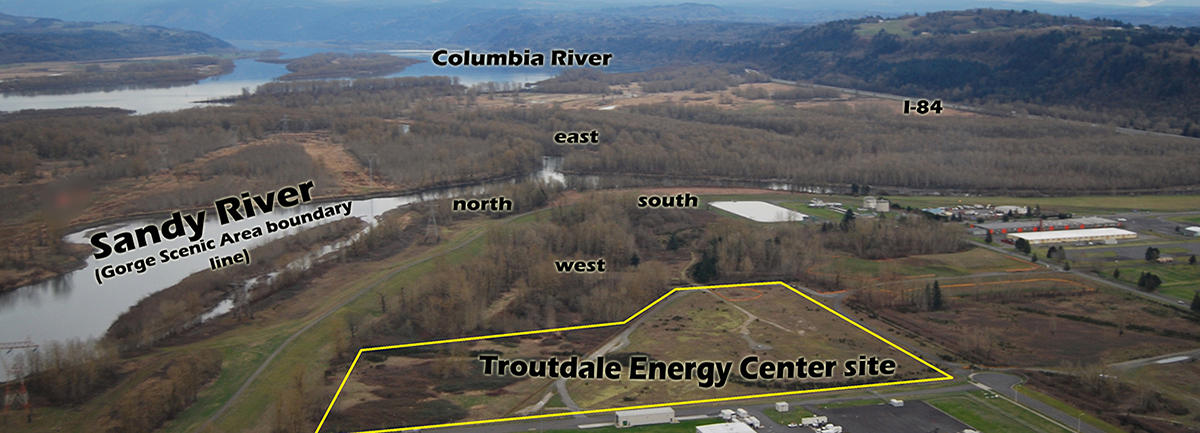Troutdale Energy Center, LLC (TEC), a subsidiary of Ares Management, L.P., has abandoned its plans for the controversial Troutdale Energy Center, a 701-megawatt gas power plant that was proposed at a site sandwiched between the Troutdale Airport and the mouth of the Sandy River, which serves as the western boundary of the Columbia River Gorge National Scenic Area.
“The abandonment of this proposal is proof that it lacked merit from the start,” said Nathan Baker, staff attorney for Friends of the Columbia Gorge. “In terms of resource impacts, this is one of the worst sites in the State of Oregon to build a large power plant. The site is literally at the gateway to the Columbia River Gorge National Scenic Area, which already suffers from significant air pollution problems.”
The proposed Troutdale power plant had been highly controversial and embattled from the start. TEC first proposed in a competitive bid to sell the project’s power to Portland General Electric (PGE), but in 2013 PGE rejected TEC’s bid, leaving it as an orphaned project with no power buyer. TEC nevertheless persisted in pursuing a siting permit from the Oregon Energy Facility Siting Council (EFSC) as well as air and water pollution permits from the Oregon Department of Environmental Quality (DEQ).
In 2014, a broad coalition of environmental organizations, pilots groups, government agencies, and local citizens intervened in EFSC’s contested case to oppose the controversial project. The parties in the contested case raised a variety of concerns, including air pollution impacts to the National Scenic Area, safety impacts to aviation operations at the Troutdale Airport caused by the project’s thermal plumes, aquifer impacts from water intake to cool the project, and noise and scenic impacts to the adjacent 40-Mile Loop trail, Sandy River, and Sandy River Delta.
EFSC’s contested case process lasted more than two years. At the time of TEC’s withdrawal, the parties were awaiting the hearing officer to schedule a hearing so that TEC’s expert witnesses could be cross-examined.
If the TEC project had been built, it likely would have replaced PGE’s coal-fired power plant in Boardman, Oregon as the single largest stationary source of air pollution in the Columbia River Gorge National Scenic Area. In a 2011 settlement agreement with Friends and other parties, PGE agreed to shut down its coal-fired plant in Boardman no later than December 31, 2020.
“The Columbia River Gorge National Scenic Area is already suffering from air pollution that obscures scenic views and harms plant habitat,” said Michael Lang, conservation director for Friends of the Columbia Gorge. “A major new source of pollution at the gateway to the Gorge would have only worsened those impacts.”
During the energy siting process, the U.S. Forest Service advised state agencies that air pollution from the TEC facility would harm visibility and cause nitrogen deposition in the Gorge. Visibility impacts would occur in the form of haze, as well as distinct air pollution plumes that would be visible from important viewing areas, such as Crown Point, during summer months. Acid deposition caused by the facility would have also harmed Gorge ecosystems.
The TEC proposal also severely threatened aviation safety. A Federal Aviation Administration-approved modeling program showed that thermal plumes from the proposed Troutdale Energy Center (TEC) would create a one in one hundred risk of severe turbulence for the light aircraft that predominately use the Troutdale Airport, which likely would have resulted in fatal accidents. Thermal plumes caused by the gas plant would have exceeded the FAA’s target level of safety for light general aviation aircraft, business jets, and narrow-body jets. The hazard for business jets and narrow-body jets would extend into Portland International airspace.
The power plant would also have been located within seventy feet of the regional 40-Mile Loop trail. Noise from the facility would have made it difficult for trail users to communicate, creating an unnecessary safety risk of accidents between cyclists and pedestrians. The project’s noise would have also harmed noise sensitive wildlife species in the surrounding area, including at the Sandy River, Sandy River Delta, and Sundial Island.
“Gorge residents and visitors alike will be able to breathe easier with the abandonment of this massive source of air pollution,” said Lang. “But now that the threat of this poorly planned project has ended, we call on the Oregon DEQ, Columbia River Gorge Commission, and U.S. Forest Service to clarify and strengthen the rules that protect air quality in the National Scenic Area to ensure that large pollution sources like this will not harm the Gorge.” 